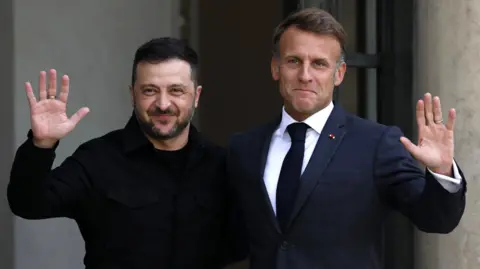Macron says 26 countries have pledged forces to Ukraine once a ceasefire is agreed
French president announces commitments from a 'Coalition of the Willing' after a summit at the Élysée Palace; U.S. role remains unconfirmed
Twenty-six Western allies have formally committed to deploy troops "by land, sea or air" to Ukraine the day after a ceasefire deal is agreed, French President Emmanuel Macron said after hosting a summit of 35 countries at the Élysée Palace.
Macron made the announcement at the close of the meeting, which he described as a "Coalition of the Willing" and which was attended by Ukrainian President Volodymyr Zelensky. The French president said the force would serve as a "reassurance force" to help stabilise the situation immediately following any negotiated end to active hostilities.

Macron said he expected agreement from the United States on participation in the reassurance force to be finalised in the coming days, but there was no formal confirmation that U.S. forces would take part directly. The French president said he had "no doubt" that Washington would be willing to support security guarantees for Ukraine, while U.S. President Donald Trump has recently suggested that American backing could "probably" take the form of air support.
Mr Trump spoke by telephone with Western leaders following Thursday's meeting, Macron said. Ukrainian President Zelensky told reporters he had spoken with the U.S. president about providing "maximum protection for Ukraine's skies" and that Kyiv had proposed a format for Washington to consider.
Macron also noted that hopes for a negotiated settlement had dimmed since Russian President Vladimir Putin met with Mr Trump in Alaska last month, an account the French leader said had influenced the international atmosphere surrounding ceasefire talks. The French announcement did not identify the 26 committed countries by name or detail the timing, size or command arrangements of the planned deployments.
The Élysée-hosted summit brought together governments seeking to present a united front on security guarantees and post-ceasefire arrangements for Ukraine. Macron described the pledges as intended to reassure Kyiv and deter further escalation in the immediate aftermath of a cessation of hostilities.
Diplomats and defence officials from participating countries are expected to work through the legal, logistical and political steps required to put forces on standby and to establish rules for deployment. Macron said NATO framework options and bilateral arrangements were among the formats being considered, but he did not spell out a final model.
Any international deployment after a ceasefire would mark a significant escalation in Western involvement compared with current levels of support for Ukraine, which so far have focused on weapons, intelligence sharing and training. Officials cautioned that the commitments announced relate to action to follow a negotiated settlement, not to a pre-emptive intervention.
Macron said discussions would continue in the coming days to clarify roles and contributions, and he urged continued international coordination. He characterised the summit as a demonstration of solidarity with Ukraine while acknowledging remaining diplomatic obstacles to securing a ceasefire agreement.
Further details on which nations will contribute forces, the operational command structure, and legal mandates for any deployments are expected to emerge as participating governments complete internal approvals and agreements.